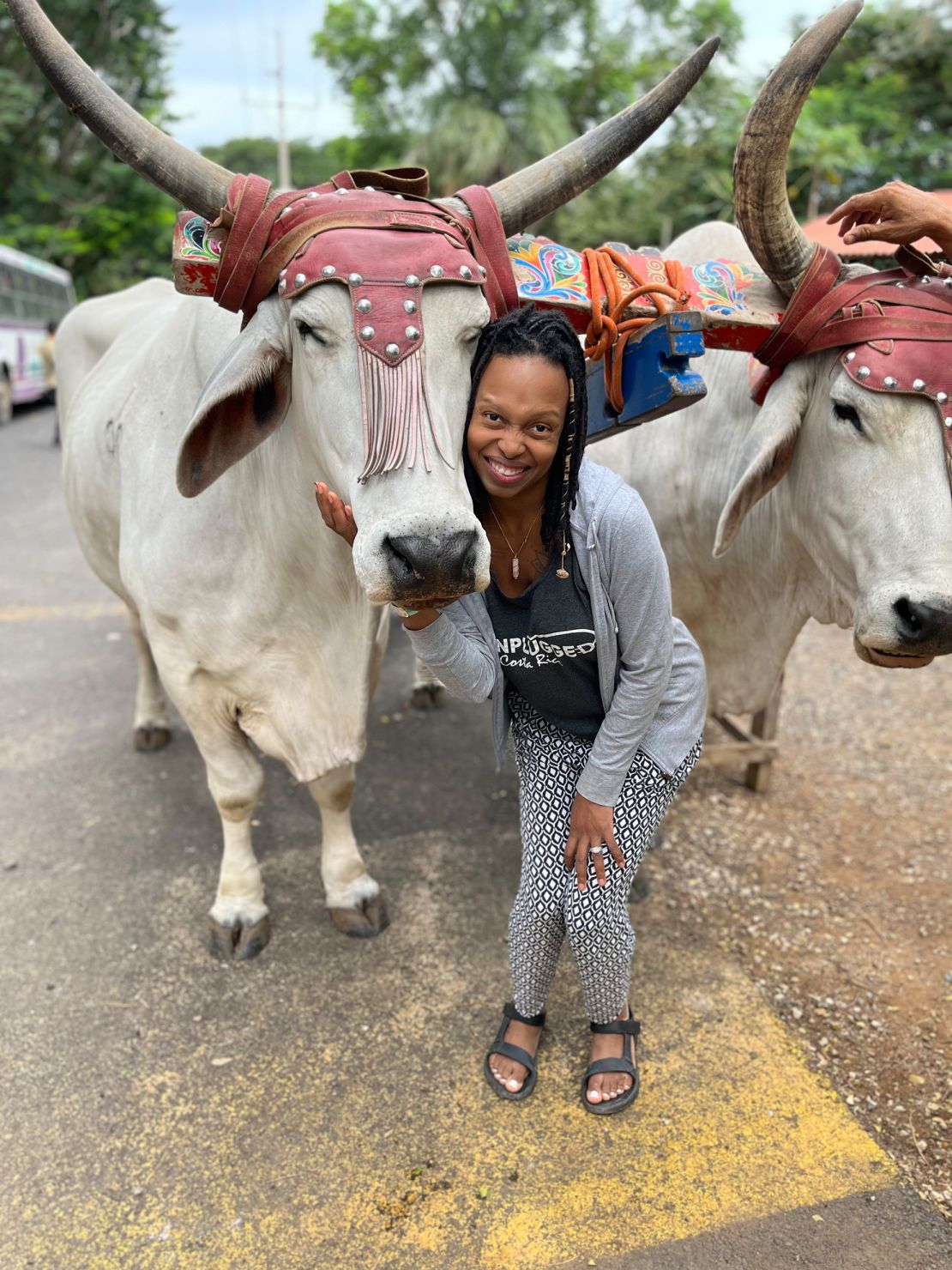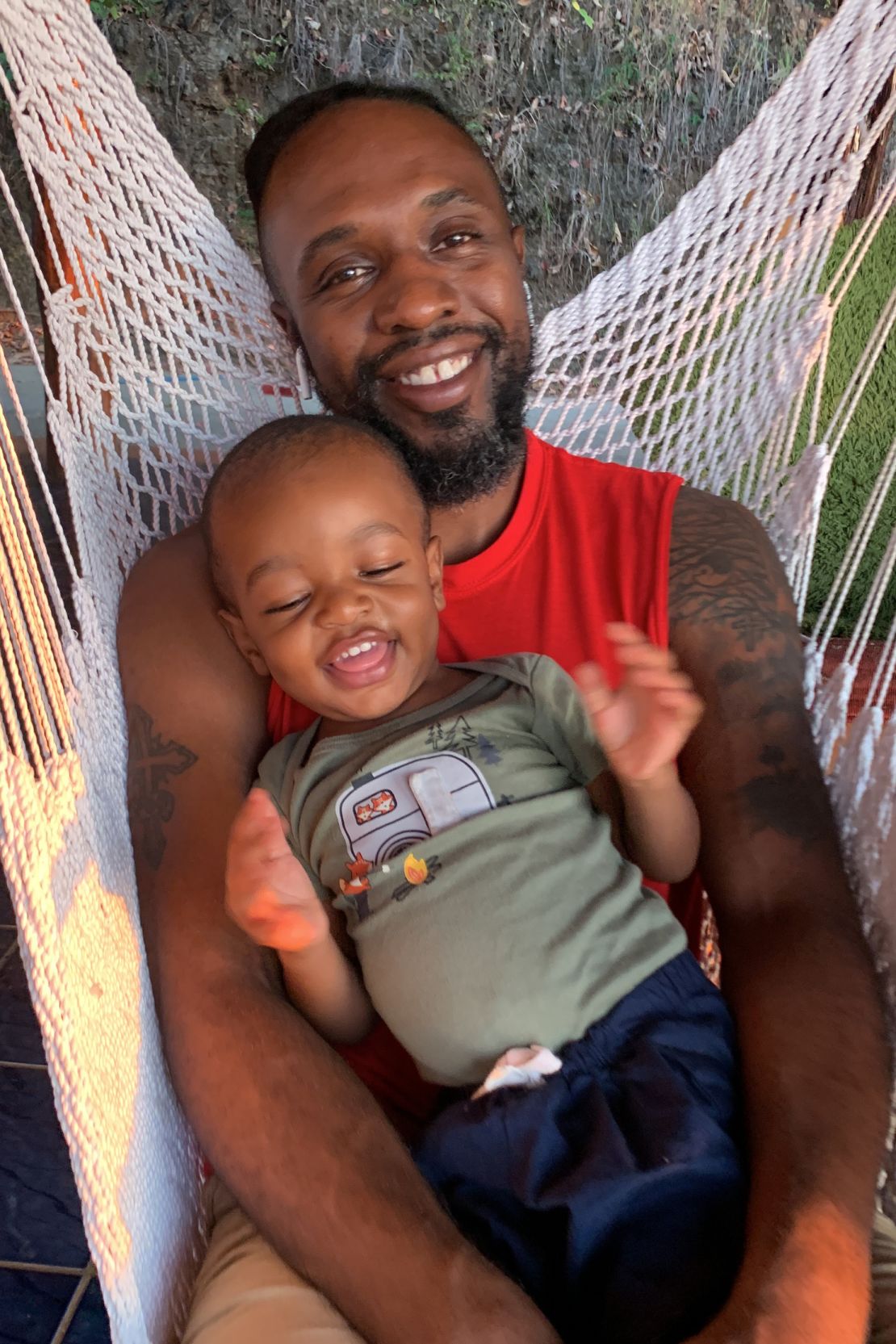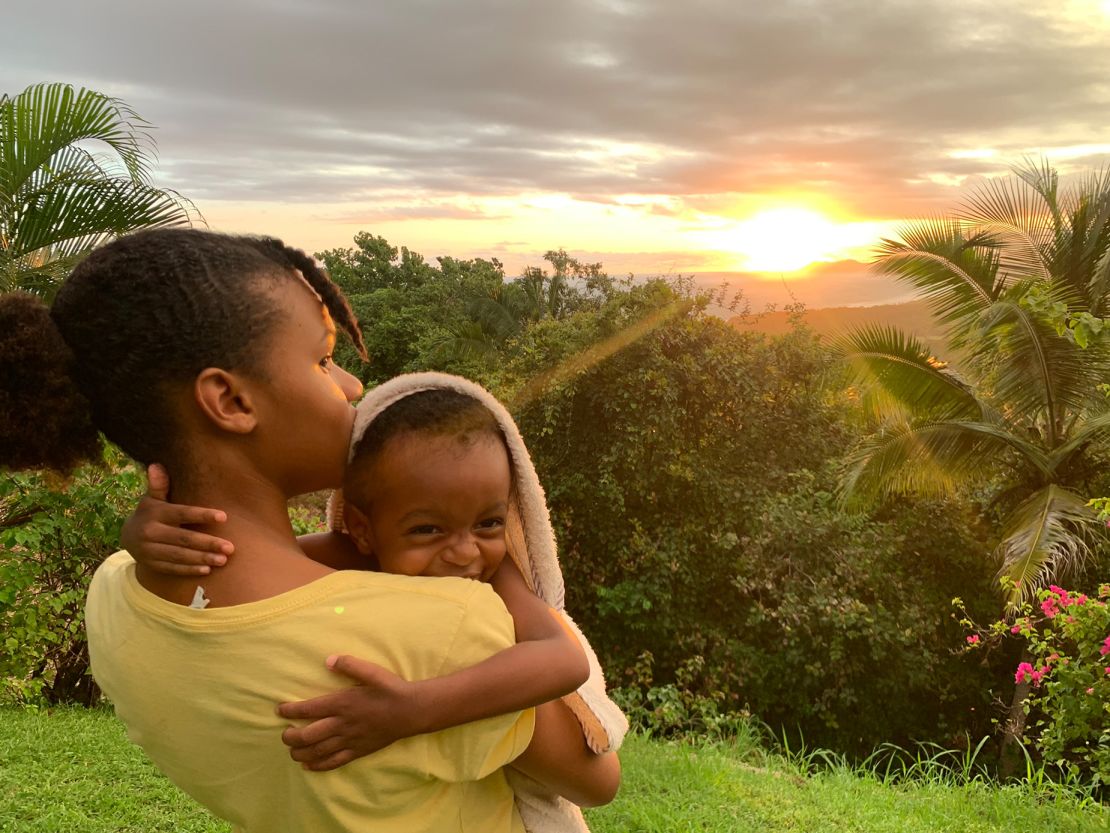CNN
—
When Kema Ward-Hopper and her then-fiance Nicholas Hopper, each from the US, determined to get married in Costa Rica, that they had no concept that they’d find yourself relocating there just a few years later.
However a collection of devastating occasions led the couple and daughter Aaralyn, now 15, to a brand new life within the Central American nation’s very personal “blue zone,” one of many areas of the world the place folks stay longest and are the healthiest.
Ward-Hopper, a well being and life coach, was identified with breast most cancers just a few months earlier than their marriage ceremony in 2016.
“[I had] began remedy and all the things,” Ward-Hopper tells CNN Journey. “If you happen to see footage from my marriage ceremony, I didn’t have hair, and I didn’t actually seem like myself. However I used to be sick.”
Whereas she hadn’t been feeling nicely earlier than they traveled to Costa Rica for his or her huge day, Ward-Hopper observed a change in her vitality ranges throughout the time that they spent there.
“I simply felt the perfect that I had been feeling since I’d been identified,” she says. “Once we bought again.
“That feeling good… I assumed that I used to be getting higher. Nevertheless it actually appeared prefer it was environmental, as a result of after a few week, I used to be feeling unhealthy once more.
“In order that was the primary indicator that there was one thing particular about Costa Rica.”
Ward-Hopper went on to have a unilateral mastectomy earlier than present process reconstruction surgical procedure and the household, who had been primarily based in Houston, Texas, tried to return to regular.
Nevertheless, they suffered one other main blow when their house was destroyed by a Class 4 hurricane in August 2017.
“I had the surgical procedure after which Hurricane Harvey hit Houston,” she says. “And we ended up shedding our house. So it simply appeared like plenty of unhealthy issues [happening] again to again to again to again.”
After struggling to discover a new house, the couple realized that there wasn’t something holding them to Houston anymore, and determined that it was time to maneuver on.
“My husband was like, ‘Properly, let’s simply depart the nation,” provides Ward-Hopper.
They initially mulled over relocating to 4 potential locations – Ghana, Sweden, Mexico, and naturally, Costa Rica.
“Costa Rica ended up successful out over the opposite locations that had been on our record,” provides Ward-Hopper, explaining that they had been impressed by the nation’s well being care and training system, in addition to the environmental protections in place – Costa Rica is the first tropical nation to have reversed deforestation.
“Ever since we left there from our honeymoon, we simply felt like we needed to get again there and simply really feel good,” she provides. There’s one thing energetic about being in Costa Rica.”

Ward-Hopper goes on to clarify that the nation’s proximity to the US – Costa Rica is lower than 4 hours from Houston by aircraft, was a significant factor of their determination.
“It simply felt so serendipitous,” she says. “I really feel like if we had chosen one of many different places, we might have finished far more analysis and preparation than we did for Costa Rica.”
In 2018, round eight months after deciding to make Costa Rica their new house, the household left Houston to begin afresh in Pueblo Nuevo, a neighborhood positioned within the Nicoya Peninsula, one of many world’s blue zones, together with Loma Linda in California, Italy’s Sardinia, Japan’s Okinawa and Greece’s Ikaria.
“My husband and I got here first and we had been right here for six weeks with out my daughter,” says Ward-Hopper, explaining that they’d signed a lease on a property a pal had discovered for them.
“It was like a second honeymoon.”
The couple spent their time tending to their backyard, assembly the locals and getting used to their new environment.
“We had been within the jungle,” she says, recalling how they needed to adapt to the sounds and creatures that got here with their new surroundings.
“It was an journey. My reminiscence of that point may be very fond. By the point we got here again with our daughter, it was peak wet season. In order that was a complete journey in and of itself.”
As they’d entered Costa Rica on a vacationer visa, the couple had been solely permitted to stay within the nation for 90 days at a time, and would often return to the US to resume their visas.
Fortunately, Ward-Hopper already spoke Spanish earlier than they arrived, whereas her daughter had some information of the language, which helped the household to transition extra rapidly.
“I don’t know that we might have gotten a number of the offers that we’ve gotten had we not had the flexibility to speak,” she says, including that her husband, who runs a logistics enterprise, has been studying Spanish throughout their time there.
Because the household settled into life in Costa Rica, Ward-Hopper, who describes their first 12 months within the nation as “one lengthy studying expertise,” was notably struck by the nation’s robust sense of neighborhood.
“I had an concept of what I assumed neighborhood was, however that was fully obliterated once I bought right here and skilled true neighborhood,” she says.
“The locals had been useful whether or not they knew you or not… It was wonderful. The neighborhood actually appeared out for one another.”

In line with Ward-Hopper, Aaralyn tailored in a short time and loved with the ability to spend a lot time on the seashore and happening “numerous hikes.”
“My husband and I each commented that she was capable of form of have a childhood like we had within the 80s and 90s,” she says.
“Having the ability to go outdoors and play outdoors of the watchful eye of your dad and mom.”
The household additionally discovered that they felt extra energized, which Ward-Hopper attributes to entry to recent fruit, greens and complete meals, in addition to cleaner air.
“The well being advantages of the blue zone, I believe, present up later in life,” she says.
“However we now have observed that we really feel higher after we’re right here. Our cardiac well being and lung well being appears to be higher.”
In August 2019, Ward-Hopper realized that she was pregnant together with her second baby.
“It was a bizarre flip of occasions,” she admits. “I didn’t count on to get pregnant.”
When the worldwide Covid-19 pandemic hit in 2020, shutting down a lot of the world, the household had been granted permission to stay in Costa Rica on their vacationer visas.
Ward-Hopper welcomed her son Nicolai at their house in Pueblo Nuevo in April 2020.
Other than not with the ability to have prolonged household together with her as a consequence of border restrictions, she says that giving beginning in Costa Rica turned out to be a beautiful expertise.
“The beginning of my son was form of like a meditation,” she provides. “All the pieces was so intentional… I want I may have had the expertise with my daughter.”
Sadly, Ward-Hopper’s sister handed away immediately just a few months later.
Because of the problems round border restrictions on the time and the truth that Nicolai was born in Costa Rica and would have been unable to depart at that stage, Ward-Hopper made the troublesome determination to not return to the US to be together with her household.
“That was additionally a very exhausting level in our journey,” she says, earlier than recounting the best way the local people rallied round them to guarantee that they “felt cherished and supported.”
“That’s the form of neighborhood that we stay in,” she provides.
The household of 4, who’ve since moved to a bigger home in Nicoya, are actually settled in Costa Rica and their lives couldn’t be extra totally different than they had been in Houston.
For Ward-Hopper, top-of-the-line issues concerning the Costa Rican way of life is the best way during which youngsters are embraced in just about each side of on a regular basis life.
“I really feel like within the States, you’re feeling strain taking your younger baby out to dinner or one thing,” she says.
“Right here, in case your child needs to play and stroll across the desk, then they let you know to depart them alone and allow them to. So it’s simply totally different.

“They love youngsters. And I don’t essentially know that I felt the identical when my daughter was little.
“It’s a really household oriented nation. Households undoubtedly [come] first.”
Ward-Hopper, who has been “most cancers free” for a number of years, has tailored to a slower paced way of life and realized to not “be so uptight.”
“Within the US, all the things is tremendous quick,” Ward-Hopper says, noting that she’s needed to be taught to cease apologizing each time she’s a couple of minutes late.
“You recognize the saying, ‘If you happen to’re on time, you’re late.’ However right here, that isn’t the case.”
The typical life expectancy in Nicoya is alleged to be round 85 years and the area has a lot of centenarians.
“They’re [the centenarians] pleasant to speak with,” Ward-Hopper says, noting that she’s all the time touched to see the best way during which the native households handle one another, with the previous caring for the younger, and the younger caring for the previous.
“The aged are part of caring for the youngest era – their grandchildren, or their nice grandchildren, as a result of they’re in such good condition,” she says.
“And it’s that means as a result of they’re hardworking folks, they usually stroll plenty of the locations they usually eat rather well.
“So I believe all of these issues contribute to their lengthy life. Additionally they stay with the land and never despite the land.
“So that they don’t attempt to take away the entire nature in order that they’ll exist. They simply form of exist with the character. A minimum of the place we stay.”
Whereas Ward-Hopper says that there are countless advantages to dwelling in Costa Rica, she stresses that it’s not essentially extra inexpensive than the US.
“Costa Rica is the most costly nation in Latin America,” she says. “However I additionally assume that relies on the way you’re making an attempt to stay.”
Ward-Hopper factors out that the price of dwelling in areas of the nation the place there’s a “excessive ratio of expats to locals” might be across the similar because the US.
“The place we stay, it could be far more costly, [to have the same] high quality of life dwelling again in Houston,” she says.
“So for us it’s extra inexpensive, it’s getting dearer as extra folks transfer to Costa Rica.
“However there are nonetheless locations you’ll be able to go and stay cheaper. Nevertheless it’s distant from the most well-liked spots.”
Even after a number of years of dwelling within the nation, Ward-Hopper says she’s nonetheless as amazed by its unbelievable nature as she was to start with.
“I’m so grateful, as a result of I used to be fearful that each one this may grow to be simply the norm,” says Ward-Hopper. “Nevertheless it hasn’t but… We’re nonetheless seeing new creatures this a few years in. In order that’s enjoyable.”
Ward-Hopper and her husband and daughter all turned everlasting residents of Costa Rica after the beginning of Nicolai, who’s a Costa Rican citizen.
Though they don’t have any want to return to the US, Ward-Hopper misses her “mates, household, and Amazon,” and yearns for a standard US winter each from time to time.
“When Christmas rolls round, generally I simply wish to placed on fuzzy socks and an enormous hoodie and curl up someplace cozy with a mug of sizzling chocolate whereas it’s chilly outdoors,” she says. “However that doesn’t occur [here]. It’s a sizzling Christmas.”
And whereas they’re comfortable to remain the place they’re in the intervening time, the household don’t essentially plan to stay in Costa Rica indefinitely.
“I believe Costa Rica shall be [our] house base, however we do have plans to journey and expertise different components of the world,” Ward-Hopper provides, explaining that they’re contemplating spending time in Colombia and Brazil.
“I suppose we’re extra nomadic than stationary, however Costa Rica looks like house.”











